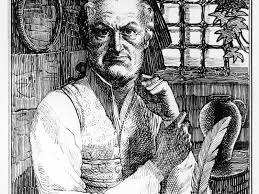
Tuesday
As the Trump Administration puts forth measures that will throw as many as 750,000 people off the food stamp rolls, I am tempted to rerun an old post quoting Scrooge on workhouses and the poor. Certainly ’tis the season for it. Political scientist John Stoehr, however, has me thinking about such proposals in a different way.
Trump isn’t advocating cuts because he is miser pinching pennies, Stoehr argues. He’s doing so because he’s a sadist.
Raising the issue of sadism calls for an examination of the novels of the Marquis de Sade, which are still unsurpassed in their articulation of this pathology. Before turning to them, let’s first look at what Stoehr has to say.
His piece appeared last August when we were learning about new horrors (which continue unabated) being inflicted on immigrants seeking asylum. Most shocking, of course, is children being separated from their parents, not to mention the several who have died in custody. The suffering of children strikes us particularly hard because they don’t deserve it. Nor do their parents, I would add, but with children the cruelty stands out.
While Trump and his defenders claim such cruelty is necessary if immigrants are to be discouraged from coming to America, Stoehr observes that Trumpists offer such a rationale only because they can’t admit the real reason. In actuality, they believe these people deserve to be punished. The point is not a successful policy initiative but the pain itself:
The thing about a sadist president is that he doesn’t care if his sadist policies don’t work. The other thing is that he can’t tell us that he doesn’t care if they don’t work. He doesn’t care if they don’t work, because “working” doesn’t matter.
Policies leading to appreciable outcomes are of no consequence. He can’t tell us that he doesn’t care if his sadist policies don’t work because sadism for its own sake is unthinkable to us.
Examining a number of the immigration policies, Stoehr notes they have little to do with deterrence:
So the president says… that his administration is withholding basic medical care as a deterrent to illegal entry.
Of course, withholding basic medical care is not a deterrent to illegal entry any more than confiscating toddlers from mothers is a deterrent, any more than sabotaging the legal right to asylum is a deterrent. Immigrants are crossing the border improperly as I type these words.
But again, “working” is beside the point. The president’s point is punishing brown foreigners for the crime of being brown and foreign.
Similarly, it does not matter that locking up children indefinitely will not stop illegal entry. What matters is locking up people indefinitely who deserve being locked up indefinitely.
Sade’s novels are so dark as to be all but unreadable. In 100 Days of Sodom, he systematically imagines hundreds of tortures, some of them recounted and some of them perpetrated on a dozen or so young people who have been kidnapped and taken to a fortress in the Alps. Each torture is worse than the one before, with painful death the ultimate end.
In Juliette he follows the life of a female sadist and all the horrors she and her accomplices mete out to their victims. Once scene occurs during a picnic on Mount Vesuvius where we see two women turn on a third, bind her, bite and stab her countless times, and finally throw her into the volcano.
I focus here on Justine, however, because it focuses on an innocent victim. In watching what happens to a sweet young woman as she is captured by one sadist after another, we get a glimpse into why Trump might not be upset by “kids in cages.”
Forget realism in the depiction of Justine. It defies logic how someone could remain innocent, not to mention bodily intact, in the face of all that happens to her. She is tied up, stretched out, raped, whipped, beaten, branded, pricked, bitten, and countless other things in the course of her adventures. Through it all, however, she retains her innocent trust in virtue. Her very innocence enrages her tormentors, who seem to regard it as a personal affront.
And this, I think, helps us understand the mania. They are venting their rage against their own lost innocence as they torture Justine, who must pay for reminding them of what they have lost. When they whip her, they feel as though they are triumphing over their own vulnerability.
At the end of the novel, when Justine appears finally to have reached a place of safety, she is blasted by a lightning bolt. Sade sees innocence in this fallen world as so unnatural that nature will wipe it out if humans don’t.
If Stoehr is right, then Trump is not just unmoved by the suffering he is causing. He gets a thrill from it.
Now that I think about it, Trump as a sadist shouldn’t come as news to us. We saw him voicing sadistic fantasies when he told police to rough up suspects during arrests and when he encouraged fans to beat up protesters. If it were up to him, he informed us during the campaign, he would bring back waterboarding “and a hell of a lot worse.” He finds it thrilling to engage with autocrats who have the power to mete out suffering and death, such as a Philippine president responsible for thousands of extra-judicial drug killings.
I suspect Trump was far from upset at what happened to Saudi journalist Jamal Khashoggi. Perhaps he fantasizes about taking a bonesaw to various American journalists.
I could play therapist and speculate how Trump is making the immigrant children pay for how his fascist father crushed his own innocence. This doesn’t excuse him, of course, but knowing sadism’s dynamics helps us understand him better.

